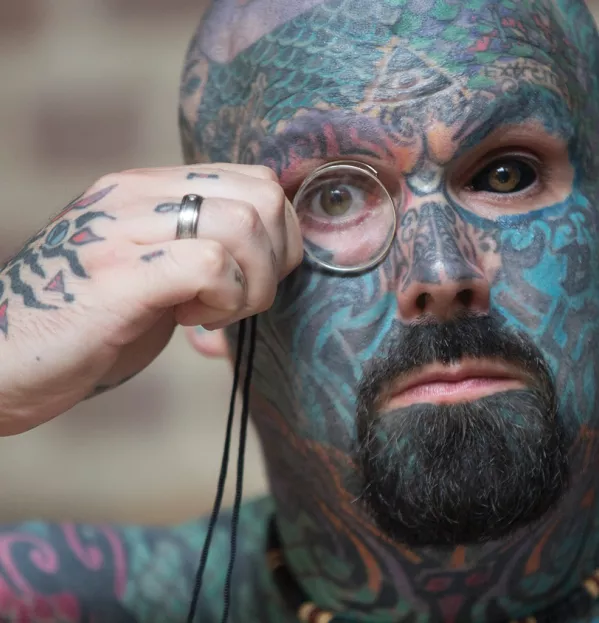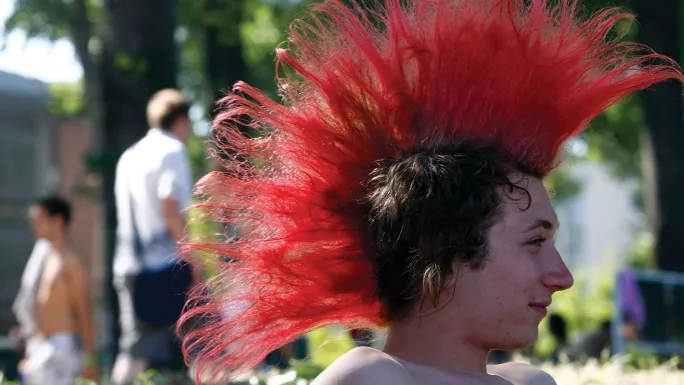Do I look like a teacher?

Seven. That’s how many times I’ve been tattooed, the most recent being last summer. You might assume getting tattoos is the teenage rebellion I never quite grew out of. But aged 32 - and with a similarly inked spouse - I don’t really have anyone to rebel against.
Perhaps it’s a rebellion not from “whom”, but “what”? Could my tattoos be an attempt to distance myself from the seemingly sterile confines of my school-teacher identity?
No, not one bit.
The blunt truth is I have seven tattoos because I like the way they look. Yet, despite my love of them and the numerous hours of discomfort I’ve endured to have them, my tattoos remain hidden once I am through the school gates. From the moment I pull up in the car park until I drive off at night, I’m happy to look the same as the other suited and booted teachers. I’m comfortable conforming with the school policy that dictates tattoos should not be visible.
Since I achieved qualified teacher status, I have valued the professional air it gives. Much like a doctor’s white coat, for me, donning smart dress is an extension of the pride I feel for my role. Surely, in a political climate that has sought to devalue the professional status of teachers and denigrate the job we hold so dear, any outward symbol of respect is to be embraced rather than quibbled over?
In my opinion, there is also power in being able to challenge students on uniform when you can say honestly that you have also had to put one on that morning. I can’t hide the scar from my lower lip piercing, which is regularly pointed out by students, but my removal of the stud can be used as a lever for getting teenagers to take out their own facial piercings.
Yet teaching is about relationships, and relationships are about authenticity and honesty. How honest are those of us who hide our true selves away at school?

My readiness to change the way I look while at school isn’t shared by all teachers. English teacher Haili Hughes says that, for her, changing her identity for school time is out of the question.
“I’d feel like a complete fraud,” she says. “I spend the majority of my life in school, so I would hate to feel uncomfortable pretending to be something I’m not. I’m not a good enough actress.”
For Hughes, her dyed hair and tattooed arms are part of her wider mission to teach students to be tolerant of difference, as well as pride in their own identities. “I want to be a lifeline to all of those kids out there who feel marginalised and different, and say, look, it will be OK,” she explains.
Jenny Hughes, a maths teacher at a further education college, says that having an alternative image “can actually be quite helpful” when teaching a classroom of GCSE maths resit students.
“They often feel like they’ve had negative experiences with maths in the past, so the fact that I usually look quite different to their previous teachers can buy me a bit of time to establish that maths is going to be different here,” she adds.
When I wrote a blog on this topic for TES during the summer, many other teachers responded in the same way. Tattoos and body piercings did not negatively affect their role as a teacher, they argued; if anything, it enhanced their status among students. The same went for hair colour: they felt that they needed to be “honest” about who they were.
Role models
I would certainly agree that, contrary to the opinion of some, dressing alternatively doesn’t make you a bad role model. It plays no role whatsoever in how good a teacher you are. Even after doing my utmost to cover them, some of my students know I have tattoos and I don’t feel that this has been detrimental to my effectiveness in class.
I also recognise that the extent to which you reveal your private self is a highly personal decision. The point at which I feel “honest” will be different to others’.
Of course, for many teachers, it is impossible to completely separate personal and professional worlds, as they live in the catchment area, share their street with students, or have children who attend the school. But given the choice, every teacher will make an individual decision about where the boundary lies between being authentic and inauthentic.
Does that mean I am against schools taking personal choice away from teachers? I’m fortunate that my school reflects my own view that teachers should dress professionally, but what if it did not? What if I wanted to show my tattoos?
Schools, like teachers, are individual entities and, as such, differ in their approach. The degree to which ‘alternative’ identities are accepted may depend on the type of school and its context.
A school under the intense scrutiny of special measures might feel less able to support a teacher with visible tattoos, whereas private and grammar schools may feel they have an image to uphold.
Of all the sectors, my own experiences suggest that secondary might be the least tolerant of teachers presenting an alternative image, with primary and FE being more willing to accept those who look different.
Shared values
Is it right that schools and colleges can dictate in this way?
One tattooed primary school teacher told me that, “if the school has a particular standpoint on something, it’s vital for staff to be seen upholding this”.
I would agree. A successful school has a staff body that works towards the same goals underpinned by the same core values. If you can’t support those values, then you should question if it’s the school for you.
I can understand why some teachers think that hiding their true selves from students would leave them feeling compromised.
In this situation, it is important to find a school that would let you be who you wanted to be. In the same way that we seek out schools that match our philosophy of teaching, of behaviour management and our aims for students, we should look for students who match our view on where that line between personal and teacher identity sits. There is a school out there for everyone.
“I’ve been lucky enough to work in two very inclusive schools with very forward-thinking and progressive heads who see past my image at my teaching,” says Haili Hughes.
How honest are those of us who hide our true selves away at school
Wherever the rules on appearance are a little vague, it is always best to ask senior staff. Querying whether your Doc Marten boots or Leeds Festival wristband is appropriate will spare you an awkward conversation with a senior leader further down the line. If you don’t feel that these standards are being applied consistently, then it’s similarly important to speak up to clarify the house rules.
As for finding the right line on appearance if official guidance is lacking, there is an easy rule of thumb: consider whether you would present yourself like that in front of pupils’ parents. If not, don’t wear it.
If a school is strict and you wish to be a little more forthright and push back, then remember that displaying your tattoos is not the only way to show the real you - you don’t have to up sticks and move schools immediately. Even within the boundaries of professional dress, bright colours and jewellery can hint at the alternative you. Your classroom can be a place to communicate your likes and interests to students, too.
As I mentioned earlier, my school matches my own beliefs on teacher appearance. It can be summed up by the first word of our mission statement: “aspire”. That’s what I want in a school - a desire for students to do more, experience more and achieve more with their lives. At this point in our school journey, it’s important that we reflect this through the well-recognised visual symbols of professional dress for staff, as well as our new student blazers.
After all, as a teacher on Twitter put it to me recently, “It’s really just a question of hats”. For me, there is nothing inauthentic about donning my suit as a sign of my teacher hat. As for the hat I’ll be wearing outside of school, I fancy something with a band logo and metal studs.
Caroline Spalding is director of English at Tupton Hall School in Chesterfield. She tweets @MrsSpalding
You need a Tes subscription to read this article
Subscribe now to read this article and get other subscriber-only content:
- Unlimited access to all Tes magazine content
- Exclusive subscriber-only stories
- Award-winning email newsletters
Already a subscriber? Log in
You need a subscription to read this article
Subscribe now to read this article and get other subscriber-only content, including:
- Unlimited access to all Tes magazine content
- Exclusive subscriber-only stories
- Award-winning email newsletters